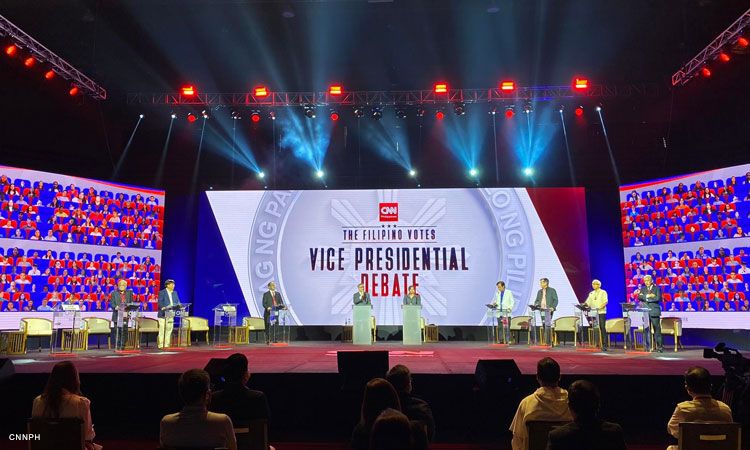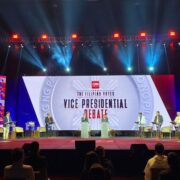
WE are less than 11 weeks away from the consequential May 9, 2022 presidential elections. Campaign season is now in full gear with political rallies in different parts of the country, online discourse and the controversial debates — all intended by the electoral system to give voters the opportunity to make better informed and conscientious decision in choosing the true leader who will steer the country in the right direction.
Unfortunately, the very new platforms that help voters be better engaged and participative in this civic exercise has proven to be a double-edged sword. The painful fact we now realize is that people may be reaching out to other voters in different parts of the world, thanks to social media and the internet, but are more deeply divided than ever, so much so that we feel we are living in two parallel universe.
Let us do a throwback to a not-so-distant past together.
In the olden days before social media and the internet, we all watched and listened to the same choices of newscasts and interviews in a handful of channels, read the news from the same options of publications. In a healthy democracy, news organizations aimed at protecting their integrity and credibility to keep their viewership high, and so they exercised due diligence in confirming news from sources and do true honest to goodness investigative research before delivering the news.
This was changed by the 24/7 news cycles of cable news in the 90s and the individualized on-demand news consumption beginning the turn of the millennium. With more competition among sources of information, “Breaking News” became the race, the sense of urgency to report ahead of the others became more important than diligence and precision in reporting.
And with a wider gamut of programming formats, the difference between entertainment and news has increasing became blurred, with more news organizations now utilizing the shock factor and sensationalism the audience find in reality shows.
Traditional news media organization had again had to deal with new reality brought about by new technology that allowed newscasts, news reports, breaking news, documentary, commentary etc. by anybody through the internet via YouTube, podcasts, etc. Every person now technically can have his or her own channel. The gatekeeping of information that used to be shared by a few news organizations who adhere to the social responsibility of delivering accurate and factual news and information have been taken away from them.
This opened the gates to the use of YouTube, Tiktok, Facebook, Instagram, Twitter etc. as channels of content that are NOT vetted or filtered for their truth, accuracy and precision. As long as you can produce something, you have the platform to air and promote it to reach a wider audience.
This is why in our engagement with other people in today’s world, made us ask ourselves “Where is that coming from? Saang planeta ka ba nakatira (What planet do youn live in?)?” especially when such platforms are being used and abused to purposely effect disinformation for some people’s dirty political tactics to deceive people, win their “trust” and mobilize them to action according their political agenda. This, unfortunately has caused people to mistrust each other’s sanity, intention, honesty, when in the past, we all believed we were working together for the same goal.
This brings us back to the importance of having DEBATES during campaign period. It is during the campaign season that each and every candidate will have the opportunity to introduce herself/himself to the voters, share her/his vision and platform to the people on how to make their life better in the next six years through her/his leadership and governance.
Convincing the electorate why they are the better candidate is done by each campaign through political ads, media interviews, online features, campaign sorties/ events/rallies, door to door reaching out to people through grassroots campaigning, mailers, etc.
However, there are campaigns that may have dished out information about the candidates’ life narrative, educational and professional background, achievements, etc. that have not been vetted or tested to be true and accurate.
Then there is the sin of omission, where candidates may have wittingly or unwittingly covered up any material information, documents, records, etc. that may reveal much about their character– something that is of paramount importance in choosing whom to vote for and be accorded with so much power and public trust that go with the Office of the President.
DEBATES, therefore, while not legal requirement, have been used every election cycle, and especially now, so that the fragmented electorate will have the chance to see the candidates vying for the presidency in one setting, subjected to the same questions covering varied issues important to the people.
This is a rare opportunity for voters to assess the candidates’ knowledge about issues, compare and contrast the substance and sincerity of their answers to the questions, observe their demeanor in the way they respond to questions, their demeanor toward the other candidates and the debate moderators, see how they think fast under pressure, because as President, this is an important qualification for the job.
Debates are also important tools to fact check candidates’ claims, and bring out material information some candidates may be hiding so that they are given the opportunity to explain head on.
DEBATES provide one singular opportunities for the candidates and the Filipino people to share one moment together, digest the same information at the same time, watch the candidates together in real time without filter or editing.
And so if the candidates truly want to help the Filipino people make one of the most important decisions they will make for their family and the nation, then they should take participating in debates seriously and sincerely.
At the end of the day, the candidates need to show their respect for their soon to be boss – the Filipino people — and the electoral process. They need to convince the Filipino people that their interest and welfare matter most to them as their elected leader, more than anything else; that in good faith they are allowing themselves to be vetted, cross-examined for their honesty, transparency, and accountability.
Only those who are hiding something , only those who feel entitled to the presidency, will not consent to this process and will continue to push for their own self-serving agenda.
* * *
The opinions, beliefs and viewpoints expressed by the author do not necessarily reflect the opinions, beliefs and viewpoints of the Asian Journal, its management, editorial board and staff.
* * *
Gel Santos Relos has been in news, talk, public service and educational broadcasting since 1989. She was a news anchor, TV host and radio commentator and public service host for ABS- CBN and DZMM. She is now working on her advocacies independently, serving the Filipino audience using different media platforms. You may contact her through email at gelrelos@icloud.com, or send her a message via Facebook at Facebook.com/Gel.Santos.Relos. Also on Twitter, Instagram: Gel Santos Relos




